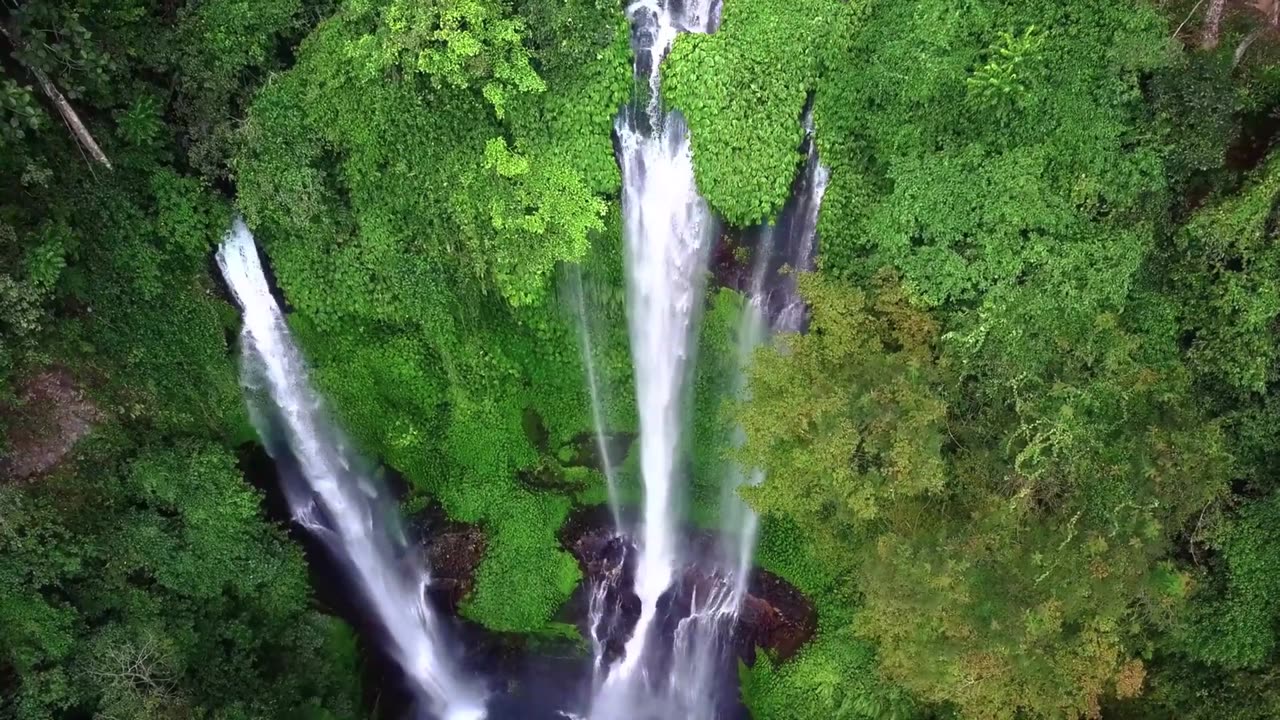Premium Only Content

BALI ISLAND 8K
Bali (/ˈbɑːli/; Balinese: ᬩᬮᬶ) is a province of Indonesia and the westernmost of the Lesser Sunda Islands. East of Java and west of Lombok, the province includes the island of Bali and a few smaller offshore islands, notably Nusa Penida, Nusa Lembongan, and Nusa Ceningan to the southeast. The provincial capital, Denpasar,[9] is the most populous city in the Lesser Sunda Islands and the second-largest, after Makassar, in Eastern Indonesia. The upland town of Ubud in Greater Denpasar is considered Bali's cultural centre. The province is Indonesia's main tourist destination, with a significant rise in tourism since the 1980s.[10] Tourism-related business makes up 80% of its economy.[11]
Bali is the only Hindu-majority province in Indonesia, with 86.9% of the population adhering to Balinese Hinduism.[3] It is renowned for its highly developed arts, including traditional and modern dance, sculpture, painting, leather, metalworking, and music. The Indonesian International Film Festival is held every year in Bali. Other international events that have been held in Bali include Miss World 2013, the 2018 Annual Meetings of the International Monetary Fund and the World Bank Group and the 2022 G20 summit. In March 2017, TripAdvisor named Bali as the world's top destination in its Traveller's Choice award, which it also earned in January 2021.[12][13]
Bali is part of the Coral Triangle, the area with the highest biodiversity of marine species, especially fish and turtles.[14] In this area alone, over 500 reef-building coral species can be found. For comparison, this is about seven times as many as in the entire Caribbean.[15] Bali is the home of the Subak irrigation system, a UNESCO World Heritage Site.[16] It is also home to a unified confederation of kingdoms composed of 10 traditional royal Balinese houses, each house ruling a specific geographic area. The confederation is the successor of the Bali Kingdom. The royal houses are not recognised by the government of Indonesia; however, they originated before Dutch colonisation.[17]
Ancient
Subak irrigation system
Bali was inhabited around 2000 BC by Austronesian people who migrated originally from the island of Taiwan to Southeast Asia and Oceania through Maritime Southeast Asia.[18][19] Culturally and linguistically, the Balinese are closely related to the people of the Indonesian archipelago, Malaysia, Brunei, the Philippines, and Oceania.[19] Stone tools dating from this time have been found near the village of Cekik in the island's west.[20][21]
In ancient Bali, nine Hindu sects existed, the Pasupata, Bhairawa, Siwa Shidanta, Vaishnava, Bodha, Brahma, Resi, Sora and Ganapatya. Each sect revered a specific deity as its personal Godhead.[22]
Inscriptions from 896 and 911 do not mention a king, until 914, when Sri Kesarivarma is mentioned. They also reveal an independent Bali, with a distinct dialect, where Buddhism and Shaivism were practised simultaneously. Mpu Sindok's great-granddaughter, Mahendradatta (Gunapriyadharmapatni), married the Bali king Udayana Warmadewa (Dharmodayanavarmadeva) around 989, giving birth to Airlangga around 1001. This marriage also brought more Hinduism and Javanese culture to Bali. Princess Sakalendukirana appeared in 1098. Suradhipa reigned from 1115 to 1119, and Jayasakti from 1146 until 1150. Jayapangus appears on inscriptions between 1178 and 1181, while Adikuntiketana and his son Paramesvara in 1204.[23]: 129, 144, 168, 180
Balinese culture was strongly influenced by Indian, Chinese, and particularly Hindu culture, beginning around the 1st century AD. The name Bali dwipa ("Bali island") has been discovered from various inscriptions, including the Blanjong pillar inscription written by Sri Kesari Warmadewa in 914 AD and mentioning Walidwipa. It was during this time that the people developed their complex irrigation system subak to grow rice in wet-field cultivation. Some religious and cultural traditions still practised today can be traced to this period.
The Hindu-Buddhist Majapahit Empire (1293–1520 AD) on eastern Java founded a Balinese colony in 1343. The uncle of Hayam Wuruk is mentioned in the charters of 1384–86. Mass Javanese immigration to Bali occurred in the next century when the Majapahit Empire fell in 1520.[23]: 234, 240 Bali's government then became an independent collection of Hindu kingdoms which led to a Balinese national identity and major enhancements in culture, arts, and economy. The nation with various kingdoms became independent for up to 386 years until 1906 when the Dutch subjugated and repulsed the natives for economic control and took it over.[24]
-
 8:01
8:01
MattMorseTV
10 hours ago $5.58 earnedHe's ACTUALLY doing it...
49.8K54 -
 15:04
15:04
GritsGG
14 hours agoHow the Rank 1 Player Warms Up on Warzone Before Stream!
3.53K -
 1:54:43
1:54:43
Side Scrollers Podcast
18 hours agoVoice Actor ROASTED For Racist Double Standard + Influencer FELONY After Con Threat | Side Scrollers
26.1K7 -
 11:03
11:03
The Pascal Show
18 hours ago $0.66 earned'THAT BABY IS GONE!' Neighbors Break Silence On Emmanuel Haro Case... Wildlife Took Remains?!
4.41K -
 LIVE
LIVE
Lofi Girl
2 years agoSynthwave Radio 🌌 - beats to chill/game to
307 watching -
 2:54:09
2:54:09
Badlands Media
15 hours agoDEFCON ZERQ Ep. 007: Flynn, Q Signals, and the Venezuela Strike
116K58 -
 2:29:05
2:29:05
FreshandFit
6 hours agoOwen Shroyer leaves Alex Jones But Here's the Truth!
23.2K19 -
 2:04:10
2:04:10
Inverted World Live
11 hours agoJapanese Memory Eraser | Ep. 101
105K19 -
 2:42:52
2:42:52
TimcastIRL
9 hours agoTrump To Deploy National Guard To Chicago, Baltimore, Democrats Call To Resist | Timcast IRL
229K101 -
 3:22:30
3:22:30
Laura Loomer
10 hours agoEP141: Muslims Call For Political Assassinations At Michigan Palestinian Conference
56.5K41